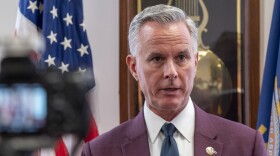A federal jury has convicted University of Kansas chemistry professor Feng “Franklin” Tao of four counts of wire fraud, in a closely watched case involving his ties to a Chinese university.
Tao, a tenured professor, was the first defendant among about two dozen academics charged under a since-disbanded Trump-era program known as the China Initiative.
Thursday's verdict followed a two-week-long trial that drew the attention of civil rights activists, who claimed the initiative unfairly targeted Chinese Americans.
The jury acquitted Tao of two additional counts of wire fraud and two counts of making false statements.
Peter R. Zeidenberg, one of Tao’s attorneys, said he was disappointed in the verdict but noted the judge said there were significant issues with the evidence in the case. He said U.S. District Judge Julie Robinson asked for briefing on Tao’s motion for a judgment of acquittal, and has yet to set a sentencing date.
“We take that as a positive sign and we are looking to getting this verdict overturned,” Zeidenberg said.
“Sometimes, unfortunately, juries get things wrong," Zeidenberg added. "There was no evidence to support a charge that anyone was defrauded because the (grant) agencies themselves said they were happy with the work (Tao) performed for them. And they also indicated that had they known he was working in China or was setting up a lab there, that would not have mattered to them in their grant decision process.”
The counts against Tao were based on government allegations that he was employed as a Changjiang Distinguished Professor at Fuzhou University through the Changjiang Scholars Program and failed to inform the Department of Energy and other grant-making agencies and KU.
The Justice Department's now-defunct China Initiative aimed to combat China’s efforts to steal American technology and trade secrets. But in many cases, rather than charge suspects with espionage, the government charged them with the more narrow crime of concealing their Chinese ties in grant proposals and from their American employers.
An investigation last year by the MIT Technology Review found that, instead of focusing on economic espionage and national security, “the initiative now appears to be an umbrella term for cases with almost any connection to China, whether they involve state-sponsored hackers, smugglers, or, increasingly, academics accused of failing to disclose all ties to China on grant-related forms.”
In January, the Justice Department dismissed a similar case against Gang Chen, a professor of mechanical engineering at the Massachusetts Institute of Technology. The government said it had obtained new information indicating that the Chinese affiliations at the center of the case were not of material importance to the funding agency, the Department of Energy, according to the New York Times.
Late in the day Wednesday, the Tao jury asked to see the transcript of testimony given by a key defense witness, Vivian Schwartz, a program manager at the Department of Energy who supervised Tao’s grants.
Schwartz had testified that Tao performed his work to the department’s satisfaction and it was immaterial to her that he was setting up a lab in China, according to Zeidenberg.
If U.S. District Judge Julie Robinson were to grant Tao’s motion for a judgment of acquittal, it would wipe out the jury’s verdict. Such motions, though rarely granted, are based on claims that the evidence at trial was insufficient for a finding of guilt beyond a reasonable doubt.
Copyright 2022 KCUR 89.3. To see more, visit KCUR 89.3. 9(MDA4OTAxNzAzMDEzMjc0MTc2MzA5ZDZlMw004))








